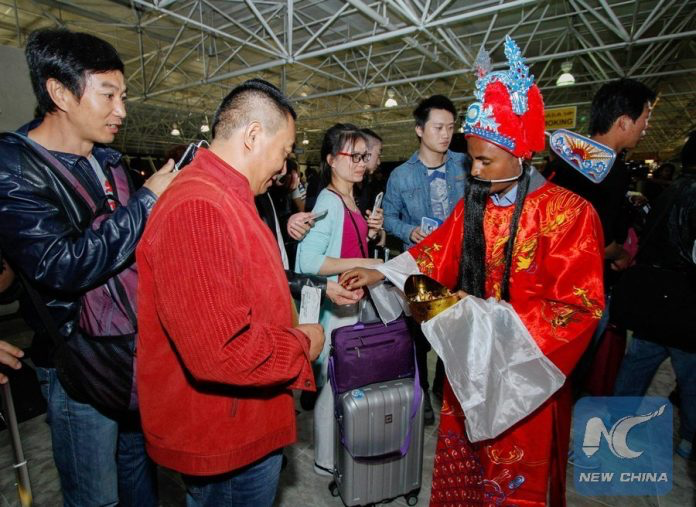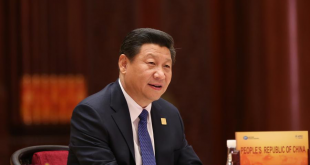Published: February 14,2023

An Ethiopian dressed up as the Chinese God of Wealth (R front) hands out gifts for Chinese passengers at the Bole International Airport in Addis Ababa, capital of Ethiopia, Jan. 20, 2017. The Ethiopian Airlines held a special event for Chinese nationals returning home for the Chinese New Year, or Spring Festival. (Xinhua/Michael Tewelde)
Teshager Moga described the communication barrier as the prime hurdle that he and fellow officers at the Foreigners’ Service Directorate within the Ethiopian Immigration and Citizenship Service (ICS) often encounter in their day-to-day engagements with foreign nationals.
“Here, nationals of different foreign countries come on a daily basis for various issues concerning their stay in our country. Unfortunately, not all of them are able to interact with us through English or other Ethiopian languages,” the ICS officer said.
Moga said the Chinese are one of the largest numbers of foreign nationals who come to the ICS to process their visa requirements and other needs. Despite their continued efforts to bridge the gaps in effectively addressing Chinese nationals, challenges emanating from the language barrier still persist.
On Saturday, Moga and 19 others who have been drawn from five directorates within the Ethiopian ICS embarked on a three-month basic Chinese language training program.
The short-term basic Chinese language training program, which will be offered by the Confucius Institute at Addis Ababa University, is expected to enable officers with basic Chinese language command.
Betelihem Hate, one of the 20 trainees, expressed her high expectations for the training in terms of enabling them to better Chinese language proficiency, eventually helping them to enhance their services to Chinese nationals.
“This is a very good and golden opportunity. Aware of the existing communication barrier the Ethiopian Immigration and Citizenship Service had previously hired a Chinese language translator to help facilitate our engagements with Chinese nationals. However, the demand still remains high,” Hate said.
Moga also said the three-month training will not only enable him and fellow colleagues with basic Chinese language skills but also to better understand China and its people. “I hope after this training we will be able to better interact and serve our Chinese friends, ultimately significantly improving our day-to-day service provision,” Moga said.
General Director of the Ethiopian Immigration and Citizenship Service Bruhtesfa Mulugeta spoke highly of the training during the opening ceremony, as he urged the trainees to serve as connecting bridges between the people of the two countries.
“The support we get shows the collaboration between Ethiopia and the Chinese government and institutions. It will fulfill the gap our officers have, that is a communication gap to serve our customers,” Mulugetasaid. “One of our honorable and known customers in our services are our Chinese brothers and sisters. In this regard, the language training given by the (Confucius) Institute is crucial to fulfilling the gap.”
Shen Qinmin, minister-counselor at the Chinese Embassy in Ethiopia, said cooperation in language education between the two countries cements the two countries’ partnership across all sectors and serves as the mainstay of practical cooperation at all levels. He said empowering service providers, such as employees of the Ethiopian ICS, with better communication skills, will create conducive conditions in terms of improving Chinese nationals’ experience in the East African country.
Che Zhaoguang, the cultural counselor at the Chinese Embassy in Ethiopia, also stressed the crucial role that language plays in connecting people toward a better future.
“A lot of Ethiopian students have graduated from the Confucius Institute and they can speak quite fluent Chinese and work in big Chinese companies. They are playing an important role in promoting the friendship and cultural relations between our two countries,” he said.
Courtesy of the everblooming Sino-Ethiopian ties, the interest in studying the Chinese language is growing fast with newly opening institutes being operational across public universities in different parts of the East African country.
In addition to Addis Ababa University, Chinese language studies are now provided across different public universities throughout Ethiopia, including the Technical and Vocational Education and Training (TVET) Institute, Bahir Dar University, MekelleUniversity, as well as Arsi University.
The Confucius Institute at the Addis Ababa University, which started operation in Ethiopia in 2012, has so far registered more than 10,000 students who passed through various levels of Chinese language studies at different facilities across the country, according to figures from the institute.
Addis Ababa University, with the help of the Confucius Institute, has also recently launched its first-ever Master of Arts (MA) program in the Chinese language in Ethiopia — the Master of Teaching Chinese to Speakers of Other Languages (MTCSOL).
Xinhua
 Africa -China Review Africa -China Cooperation and Transformation
Africa -China Review Africa -China Cooperation and Transformation
